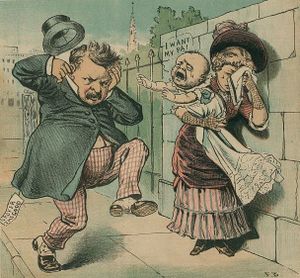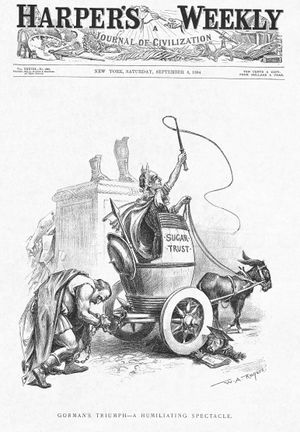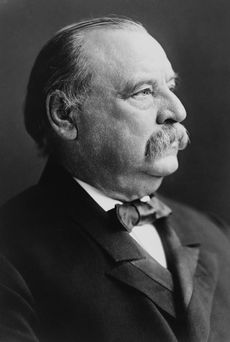گروڤر كليڤلاند
| گروڤر كليڤلاند Grover Cleveland | |
|---|---|

| |
| رئيس الولايات المتحدة رقم 22 و24 | |
| في المنصب 4 مارس 1893 – 4 مارس 1897 | |
| نائب الرئيس | أدلاي ستيڤنسن |
| سبقه | بنجامين هاريسون |
| خلفه | وليام مكينلي |
| في المنصب 4 مارس 1885 – 4 مارس 1889 | |
| نائب الرئيس | توماس أ. هندريكس |
| سبقه | تشستر آرثر |
| خلفه | بنجامين هاريسون |
| حاكم نيويورك رقم 28 | |
| في المنصب 1 يناير 1883 – 6 يناير 1885 | |
| Lieutenant | ديڤد ب. هيل |
| سبقه | ألونزو ب. كورنل |
| خلفه | ديڤد ب. هيل |
| عمدة بوفالو رقم 34 | |
| في المنصب 2 يناير 1882 – 20 نوفمبر 1882 | |
| سبقه | ألكسندر بروش |
| خلفه | ماركوس م. دراك |
| تفاصيل شخصية | |
| وُلِد | ستيفن گروڤر كليڤلاند 18 مارس 1837 كالدول، نيوجرزي، الولايات المتحدة |
| توفي | 24 يونيو 1908 پرينستون، نيوجرزي، الولايات المتحدة |
| الحزب | ديمقراطي |
| الزوج | فرانسس فولسوم |
| الأنجال | روث إستر ماريون ريتشارد فرانسس |
| المهنة | محامي |
| الدين | المشيخية |
| التوقيع | |
ستيفن گروڤر كليڤلاند (و. 18 مارس 1837 - ت. 24 يونيو 1908)، هو رئيس الولايات المتحدة الثاني والعشرين بين عامي 1885 - 1889، والرئيس الرابع والعشرون، (رئيس للمرة الثانية) بعد الرئيس بنجامين هاريسون، وتولى خلالها الحكم بين عامي 1893 - 1897.[أ] He won the popular vote for three presidential elections—in 1884, 1888, and 1892—and was one of two Democrats (with Woodrow Wilson) to be elected president during the era of Republican political domination dating from 1861 to 1933.
Cleveland was the leader of the pro-business Bourbon Democrats who opposed high tariffs, Free Silver, inflation, imperialism, and subsidies to business, farmers, or veterans on libertarian philosophical grounds. His crusade for political reform and fiscal conservatism made him an icon for American conservatives of the era.[1] Cleveland won praise for his honesty, self-reliance, integrity, and commitment to the principles of classical liberalism.[2] He fought political corruption, patronage, and bossism. As a reformer, Cleveland had such prestige that the like-minded wing of the Republican Party, called "Mugwumps", largely bolted the GOP presidential ticket and swung to his support in the 1884 election.[3]
As his second administration began, disaster hit the nation when the Panic of 1893 produced a severe national depression, which Cleveland was unable to reverse. It ruined his Democratic Party, opening the way for a Republican landslide in 1894 and for the agrarian and silverite seizure of the Democratic Party in 1896. The result was a political realignment that ended the Third Party System and launched the Fourth Party System and the Progressive Era.[4]
Cleveland was a formidable policymaker, and he also drew corresponding criticism. His intervention in the Pullman Strike of 1894 to keep the railroads moving angered labor unions nationwide in addition to the party in Illinois; his support of the gold standard and opposition to Free Silver alienated the agrarian wing of the Democratic Party.[5] Critics complained that Cleveland had little imagination and seemed overwhelmed by the nation's economic disasters—depressions and strikes—in his second term.[5] Even so, his reputation for probity and good character survived the troubles of his second term. Biographer Allan Nevins wrote, "[I]n Grover Cleveland, the greatness lies in typical rather than unusual qualities. He had no endowments that thousands of men do not have. He possessed honesty, courage, firmness, independence, and common sense. But he possessed them to a degree other men do not."[6] By the end of his second term, public perception showed him to be one of the most unpopular U.S. presidents, and he was by then rejected even by most Democrats.[7] Today, Cleveland is considered by most historians to have been a successful leader, generally ranked among the upper-mid tier of American presidents.
النشأة

حياته السياسية في نيويورك
عمدة بفلو
حاكم نيويورك
انتخابات 1884
الترشح للرئاسة
أول مدة كرئيس (1885–1889)
الاصلاح
الزواج والأنجال
الادارة والوزارة
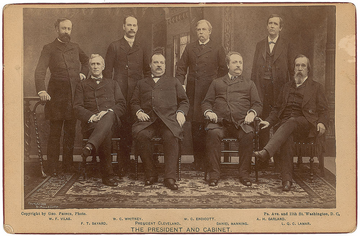
Front row, left to right: Thomas F. Bayard, Cleveland, Daniel Manning, Lucius Q. C. Lamar
Back row, left to right: William F. Vilas, William C. Whitney, William C. Endicott, Augustus H. Garland
| حكومة كليڤلاند | ||
|---|---|---|
| المنصب | الاسم | الفترة |
| الرئيس | گروڤر كليڤلاند | 1885 – 1889 |
| نائب الرئيس | توماس هندريكس | 1885 |
| None | 1885 – 1889 | |
| وزير الخارجية | توماس بايارد | 1885 – 1889 |
| وزير الخزانة | دانيال ماننگ | 1885 – 1887 |
| Charles S. Fairchild | 1887 – 1889 | |
| وزير الحربية | William C. Endicott | 1885 – 1889 |
| المدعي العام | Augustus H. Garland | 1885 – 1889 |
| المدير العام لمصلحة البريد | William F. Vilas | 1885 – 1888 |
| Donald M. Dickinson | 1888 – 1889 | |
| وزير البحرية | William C. Whitney | 1885 – 1889 |
| وزير الداخلية | Lucius Q. C. Lamar | 1885 – 1888 |
| William F. Vilas | 1888 – 1889 | |
| وزير الزراعة | نورمان جاي كولمان | 1889 |
التعيينات القضائية
تعيينات المحكمة العليا

انتخابات 1888 والعودة للحياة الخاصة
هزيمته من هاريسون
انتخابات 1892
الحملة ضد هاريسون
الرئاسة الثانية (1893–1897)
الذعر الاقتصادي وأزمة الفضة

السياسة الخارجية 1893–1897
هاواي
| "أنا افترض أن الحق والعدالة سيحددان المسار الذي يجب اتباعه في التعامل مع هذا الموضوع. فإذا ما نحينا النزاهة الوطنية جانباً وتملكتنا إما روح التوسع الإقليمي أو عدم الرضا عن شكل من الحكم يختلف عنا، فإني قد أسأت فهم مهمة وشخصية حكومتنا والسلوك الذي يتطلبه ضمير الشعب من خـَدَمـِه العموميين." |
| رسالة كليڤلاند للكونگرس حول مسألة هاواي 18 ديسمبر 1893.[9] |
ڤنزويلا، الأزمة مع بريطانيا
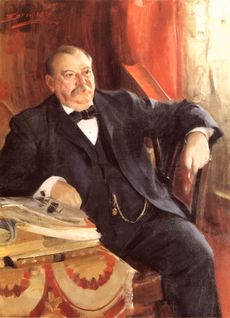
الإدارة ومجلس الوزراء
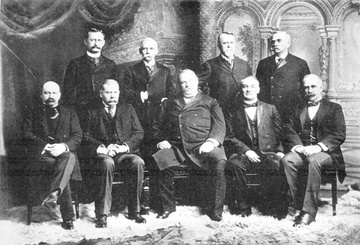
Front row, left to right: Daniel S. Lamont, Richard Olney, Cleveland, John G. Carlisle, Judson Harmon
Back row, left to right: David R. Francis, William L. Wilson, Hilary A. Herbert, Julius S. Morton
| حكومة كليڤلاند | ||
|---|---|---|
| المنصب | الاسم | الفترة |
| الرئيس | گروڤر كليڤلاند | 1893 – 1897 |
| نائب الرئيس | Adlai E. Stevenson | 1893 – 1897 |
| وزير الخارجية | Walter Q. Gresham | 1893 – 1895 |
| Richard Olney | 1895 – 1897 | |
| وزير الخزانة | John G. Carlisle | 1893 – 1897 |
| وزير الحربية | Daniel S. Lamont | 1893 – 1897 |
| المدعي العام | Richard Olney | 1893 – 1895 |
| Judson Harmon | 1895 – 1897 | |
| المدير العام لمصلحة البريد | Wilson S. Bissell | 1893 – 1895 |
| William L. Wilson | 1895 – 1897 | |
| وزير البحرية | Hilary A. Herbert | 1893 – 1897 |
| وزير الداخلية | M. Hoke Smith | 1893 – 1896 |
| David R. Francis | 1896 – 1897 | |
| وزير الزراعة | Julius S. Morton | 1893 – 1897 |
تعيينات المحكمة العليا

انتخابات 1896 والتقاعد
تكريمات ونصب تذكارية
الهوامش
المصادر وقراءات إضافية
| مناصب وتكريمات | |||||||||||||||||||||||||||
|---|---|---|---|---|---|---|---|---|---|---|---|---|---|---|---|---|---|---|---|---|---|---|---|---|---|---|---|
| |||||||||||||||||||||||||||
خطأ لوا في وحدة:Authority_control على السطر 278: attempt to call field '_showMessage' (a nil value).
خطأ استشهاد: وسوم <ref> موجودة لمجموعة اسمها "lower-alpha"، ولكن لم يتم العثور على وسم <references group="lower-alpha"/>
- Articles with hatnote templates targeting a nonexistent page
- مقالات مميزة
- مواليد 1837
- وفيات 1908
- أمريكان من أصل إنگليزي
- أمريكان من أصل ألماني
- أمريكان من أصل أيرلندي
- مشيخيون أمريكان
- مدفونون في مقبرة پرنستون
- ليبراليون كلاسيكيون
- المحافظة في الولايات المتحدة
- وفيات باحتشاء عضل القلب
- رؤساء الولايات المتحدة الديمقراطيون
- حكام ولايات أمريكية ديمقراطيون
- مرشحون رئاسيون للحزب الديمقراطي الأمريكي
- حكام نيويورك
- گروڤر كليڤلاند
- تاريخ الولايات المتحدة (1865–1918)
- عمد بفلو، نيويورك
- محامو نيويورك
- New York sheriffs
- أشخاص من بفلو، نيويورك
- أشخاص من كالدوِل، نيوجرزي
- أشخاص من فايتڤيل، نيويورك
- رؤساء الولايات المتحدة
- مرشحو الانتخابات الرئاسية الأمريكية 1884
- مرشحو الانتخابات الرئاسية الأمريكية 1888
- مرشحو الانتخابات الرئاسية الأمريكية 1892


